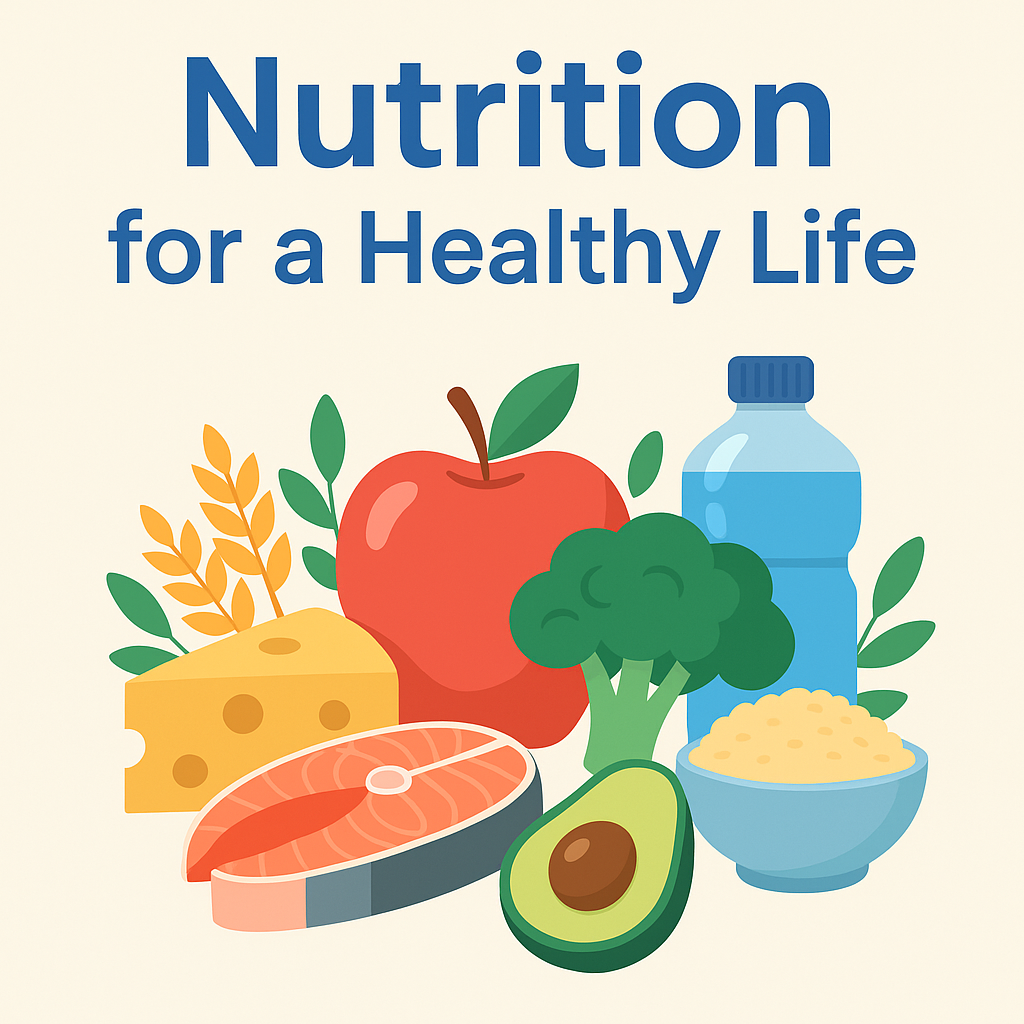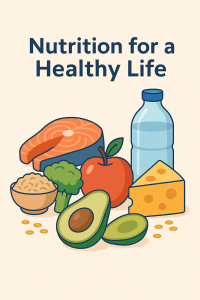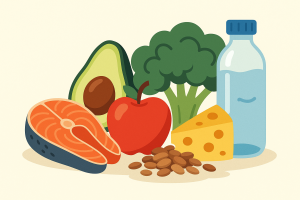
Nutrition for a Healthy Life
Nutrition for a Healthy Life
Introduction

Nutrition plays a vital role in maintaining a healthy and balanced life. It’s not just about eating food—it’s about choosing the right types of food that nourish your body. In this article, we’ll explore what nutrition means, the types of nutrients your body needs, and practical tips on how to eat for long-term health and disease prevention, especially for seniors.
What Is Nutrition?
Nutrition refers to the process of consuming and utilizing food substances that the body needs to function properly. These substances, called nutrients, are essential for energy, growth, and repair. The main categories of nutrients include:
Proteins – Help build and repair tissues
Carbohydrates – Provide energy
Fats – Support brain function and energy storage
Vitamins and Minerals – Regulate body processes
Water – Vital for digestion, temperature control, and overall function
A well-balanced intake of all these nutrients is key to living a healthy life. You can also explore Harvard’s Healthy Eating Plate for an evidence-based approach to meal planning.
Foods That Support Good Nutrition

1. Fruits and Vegetables
These are rich in antioxidants, vitamins, and fiber. They help boost immunity, support digestion, and reduce the risk of chronic diseases like heart disease and high blood pressure.
Examples: Apples, berries, leafy greens, carrots, and bell peppers.
2. Whole Grains
Whole grains contain more fiber and nutrients than refined grains. They help regulate blood sugar, support digestion, and keep you full longer.
Examples: Brown rice, whole wheat bread, oats, quinoa.
3. Lean Proteins
Proteins are essential for muscle repair and maintaining energy levels. Lean sources are better for heart health and overall well-being.
Examples: Skinless chicken, fish, tofu, eggs, beans.
4. Healthy Fats
Not all fats are bad. Healthy fats support brain function, hormone production, and heart health.
Examples: Avocados, olive oil, nuts, seeds, fatty fish like salmon.
5. Water and Herbal Drinks
Hydration is crucial for every bodily function. Drinking enough water helps flush out toxins, supports digestion, and boosts energy.
Smart Nutrition Habits
Eat a variety of foods to get all nutrients.
Limit processed and sugary foods to reduce health risks.
Control portion sizes—eating too much, even of healthy foods, can be harmful.
Avoid skipping meals, especially breakfast.
Plan balanced meals with carbs, proteins, and vegetables.
Read nutrition labels to make informed choices.
For more tips, check our article on Healthy Diet for Seniors.
Consequences of Poor Nutrition
Unhealthy eating habits can lead to serious health conditions such as:
Obesity – Excess body weight linked to poor diet
Heart disease – Often caused by high-fat, high-sugar diets
Type 2 Diabetes – Related to poor blood sugar control
High blood pressure – Triggered by excessive salt intake
Vitamin deficiencies – Resulting from limited food variety
A nutritious lifestyle also plays a major role in disease prevention, especially as we age.
Nutrition Tips for Seniors
As we age, our nutritional needs change. Older adults need more of certain nutrients and fewer calories overall.
Important Nutrients for Seniors:
Calcium & Vitamin D – Support bone health
Vitamin B12 – Important for brain and nerve function
Fiber – Helps with digestion and prevents constipation
Protein – Maintains muscle mass and energy levels
Omega-3 fatty acids – Reduce inflammation and support heart health
Healthy Choices for Seniors:
Eat soft-cooked vegetables and fruits for easier digestion
Drink plenty of fluids to stay hydrated
Choose low-sodium, low-sugar options
Include protein in every meal
Consult a healthcare provider about supplements if needed
To support overall wellness, don’t forget the importance of sleep and relaxation, which go hand-in-hand with healthy nutrition.
Final Thoughts

Eating well is one of the most powerful things you can do for your health. Good nutrition strengthens the body, sharpens the mind, and helps prevent disease. According to the World Health Organization, a healthy diet is essential for preventing non-communicable diseases and extending lifespan.
By choosing whole, nutrient-dense foods and staying mindful of portion sizes and hydration, you can enjoy a healthier, more energetic life—especially as you age.